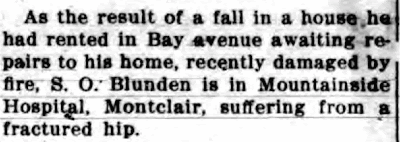B's intro essay in partial rough draft
Introduction
...
Criticisms have been few. Some
continue to believe that Russell was a Mason, part of a conspiracy seeking
world domination. If he was, he was very ineffective. Though this conspiracy
theory is dying a slow death on Internet boards, we readdress this in appendix
one. Despite irrefutable evidence to the contrary, some continue to assert that
Russell was an Adventist. We think the evidence presented in volume one is
plain. Those who reject it should do so on the basis of some evidence other
than speculation about what ‘might have been.’
Zoe Knox wrote a largely positive
review but added this suggestion: “Schulz and de Vienne make little attempt to
connect their work meaningfully to research on nineteenth-century American
religious history, which they might have done by, for example, considering what
was unique about the emergence of the Bible Students as compared with other ‘American
originals.’”[1] We think we made the most
significant connections in volume one, but her comment has led us to reflect on
the current approach to American religious history particularly by British
writers. Frankly, we thought the elements of American religious history so
obvious – so widely know – that we did not need to address them. We were wrong.
For the last three quarters of a
century the approach to so-called American Originals has been based on a flawed
often superficial understanding of America’s religious journey.[2]
Cultic growth is seen as a phenomenon primarily of the last half of the 19th
Century. Christian Science, Watch Tower faith and Latter-day Saints, grew in
this period. The growth of fringe sects continued into the early 20th
Century giving us Pentecostalism. In the minds of sociologists and some
historians, they developed out of similar causes. Sociologists especially feel
it is obligatory to make a cursory comparison between “Russellism” and other “new
religions.” Some give us a ‘compare and contrast’ essay similar to that I might
assign to middle school children.
Andrew Holden believed that Christian
Science and the Watch Tower movement arose from like causes, and he believed
that Watch Tower movement was connected to other 19th Century
religious movements: “The Witnesses were founded at a time marked not only by
great social unrest but also by the birth of a number of other world-renouncing
movements.”[3] Without clearly adopting
any of the current interpretations of millenarianism, he uncritically adopted a
generalized social-crisis view.[4]
This omits key elements in the development of Watch Tower and similar
theologies.
The remainder of this post has been deleted.
The remainder of this post has been deleted.
![Falcon's Crown: Kidnapped [e-book edition]](https://blogger.googleusercontent.com/img/a/AVvXsEhkBe00FOeBBmYbVCCTcdazS0iVnLd1WDFAqgsN2RZ54_2mWSQGowpbpnwmDREb-FVVk6AGpaGBEGezxxmeNm1qq65js_RZsBYwu6E6-3ucp3_YQyONvEK3NuIInA3Ru_cqrfm_JizezcrwPiewPQwunSXPJG1OI38N9mQwxOeGd4SvcPUf-DtO7FLMVcg=s238)






















